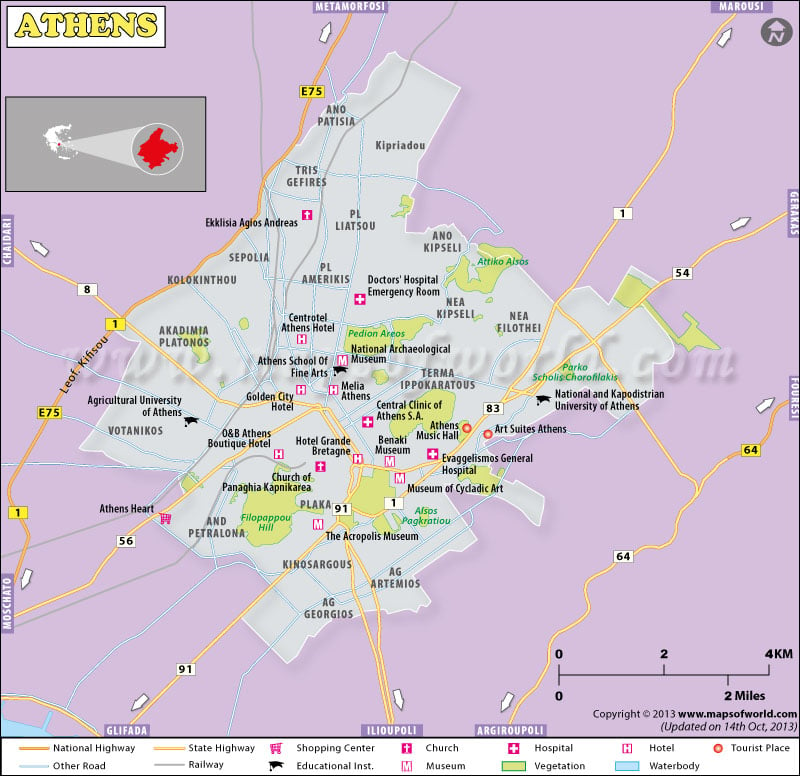About city :
Athens is the capital of Greece and the largest city in the country. The name of the city is linked to the goddess Athena. According to legends, Athena and Poseidon competed to become the patron of the city and give it their names. Poseidon gifted them naval power while Athena gave them the olive trees. The olives were accepted and the city was named after the goddess.
Athens is one of the oldest cities in the world with a history covering 3400 years. Today, the city of Athens covers an area of 412 sq. km and has an urban population of around 3 million. Classical ruins, neoclassical homes, large city squares, and parks as well as post-modern buildings have made the city a pleasure for tourists.
Geography :
Athens is located in the central plains of Attica which is surrounded by four mountains named Mount Aegaelo, Parnitha, Penteli, and Hymettus. A number of hills dot the cityscape with Lycabettus being the highest point. Rivers Kifissos and Illissus flow next to Athens which is located near the Saronic Gulf.
The city has a subtropical Mediterranean-type of climate. Summers are hot and dry while winters are cool and rainy. Some snowfall occurs on the northern fringe. Increasing pollution has led to the urban heat island effect in Athens.
How to reach (transport) :
You can reach the city of Athens by the Athens Eleftherios Venizelos International Airport which is one of the most efficient airports in Europe. Regional coaches connect Athens with other cities in Greece. Trains are the national rail service that connects Athens with other Grecian cities, though the rail service is not at par with other European cities. You can also enter the city on cruise ships via the port of Piraeus.
Within the city, you can use the Athens metro, suburban railway, tram, bus, taxi, or bicycle to explore the city. A number of car-free archeological walks have also been marked out for tourists.
When to visit :
The best time to visit the city of Athens is late spring and early summer. The months of May to July are good choices. On the other hand, winters are a rainy and low time for Athens. Summers are too hot and there may be dust storms.
Culture (Fairs and Festivals) and Traditions :
Known as the cradle of Greek and therefore the entire West European civilization, the culture of Athens is rich and diverse. The numerous ruins have made this a world center for archeological research. The people are warm and friendly and road signs are often in English which is a great help to tourists.
Several festivals are held at different times of the year in Athens. Some of them are as follows:
- The Candlemas (Ypapanti festival )is celebrated at the beginning of February. Local markets are held and this is the best time to sample typical Greek cuisine.
- The Kite festival is celebrated in March when kites are flown on the beaches and the hills. Traditional foods like octopi, shrimps, and olives are prepared on this day.
- The Feast of Flowers is celebrated with picnics in the countryside on 1st May.
- The European Music day is a three-day festival that takes place around the 21st of June.
- Perhaps the most important cultural festival in the city is the Athens Epidaurus festival which is celebrated from June to August. A number of programs including classic theatres, drama, music, lectures, and contemporary dance events are held in different locations throughout the city.
- Apart from this, several other festivals like the Aeschylia festival, European jazz festival, Book Festival, Apokries, etc are celebrated at different times in Athens.
Points of interest :
Classical ruins are scattered throughout the city of Athens. Some of the most important points of interest are:
- The Acropolis is the central landmark of the city. It is an ancient fortified town and is now a UNESCO Heritage site.
- Syntagma Square is where the parliament is and you can see the guards in Greek uniforms.
- The Panathinaiko Stadium is the original site of the Olympic Games.
- The National Art Gallery contains some of the best examples of European art.
- The Benaki Museum and the National Archeological museum are other important places to see in Athens.
- The National Garden of Athens is a peaceful and luscious area of greenery in the heart of the city.
Check: /travel/destinations/Greece/Parthenon-and-acropolis-of-Athens
Accommodation :
The joy of holidaying doubles when you have a great accommodation option at your end. And Athens ensures to help you with the best accommodation options ever. Some popular options include The Divani Caravel Hotel Athens (Luxury), Marble House (Budget), Electra Palace Hotel (5 Star), and Evripides (2 Star).

